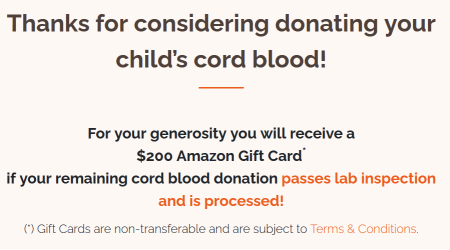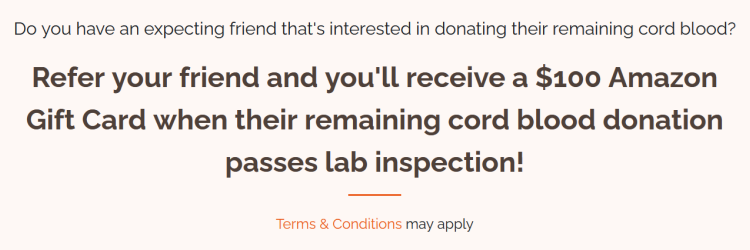You are here
Can you get paid to donate cord blood?
In the United States the answer is YES, so long as the payment is framed as a “gift”.
During the last week of December 2023, word came to Parent’s Guide to Cord Blood Foundation that one of the public banks in the US is giving out $200 Amazon gift cards in exchange for cord blood donations that meet the criteria to be stored for transplant. The public bank in question is accredited for cord blood banking and is a member of the national donor registry. However, the bank is not advertising the Amazon promotion on their own web page, instead they have partnered with a group of obstetricians that are active on social media. These birth influencers have set up a dedicated website and Instagram account for the $200 promotion, where they are using custom graphics, podcasts, and videos to promote the program. Once an expectant mom registers to donate through the website of the obstetricians, she is sent to the website of the public cord blood bank to fill out the questionnaire about medical-social history that is necessary to determine donor eligibility.
 Our initial reaction was to wonder if this promotion is legal? It is well known that in the United States donors are not paid to donate organs, and donors are not paid to donate to the national blood supply (although donors can be paid to donate blood plasma). But, upon researching the relevant laws, we discovered that the situation is not so clear cut. In the United States, it is always illegal to get paid for organ donation, under the National Organ Transplantation Act (NOTA) of 19841. However, there is no comparable law forbidding payment for blood donation. In fact, the Red Cross is currently offering to pay $350 to specialized donors willing to undergo apheresis for leukocytes. So why is it that the US national blood supply is based on volunteer donations? We learned that the volunteer blood supply is not a legal requirement, but is a policy adopted by the medical community, in response to a 1978 FDA guidance.
Our initial reaction was to wonder if this promotion is legal? It is well known that in the United States donors are not paid to donate organs, and donors are not paid to donate to the national blood supply (although donors can be paid to donate blood plasma). But, upon researching the relevant laws, we discovered that the situation is not so clear cut. In the United States, it is always illegal to get paid for organ donation, under the National Organ Transplantation Act (NOTA) of 19841. However, there is no comparable law forbidding payment for blood donation. In fact, the Red Cross is currently offering to pay $350 to specialized donors willing to undergo apheresis for leukocytes. So why is it that the US national blood supply is based on volunteer donations? We learned that the volunteer blood supply is not a legal requirement, but is a policy adopted by the medical community, in response to a 1978 FDA guidance.
In 1978 the section of the US Code of Federal Regulations (CFR) which governs the US Food and Drug Administration (FDA) adopted the policy that the labels on blood containers should be uniform and must contain a long list of required information. Among this information, section 21 CFR 606.121(c)(8)(v) requires that any blood which is intended for transfusion must be labelled as to whether the donor was a “volunteer donor” or a “paid donor”2. The FDA has periodically released updates to explain what exactly constitutes payment of a blood donor3. There is no legal prohibition on the use of “paid donor” blood products, but in practice the medical community has adopted the policy to not use “paid donor” blood products for patient treatment. No one will ever receive a transfusion of an unmanipulated blood product or a stem cell transplant from a unit that was labelled “paid donor”. The “paid donor” products go towards medical research or are incorporated into the development of pharmaceutical products.
A very good blog from the Stanford blood center explains the reasons why medical professionals have an aversion to treating patients with products from paid donors4. The primary reason is safety. If donors expect to be paid, they have a motivation to lie on the medical-social screening about their health history. There are also a host of ethical issues, but safety is the primary concern. A survey by the World Health Organization (WHO) of blood bank policies around the world found that the countries which rely on 100% voluntary blood donation have a higher proportion of regular blood donors5. Hence, there is behavioral research showing that this policy works well to sustain a national blood supply. You see this altruistic behavior when there is a disaster, and the waiting line of people who want to donate blood goes out the door of the blood bank.

How do these regulations apply to the program to give $200 Amazon gift cards to qualifying cord blood donors? Again, the story is not simple. According to the FDA guidelines, it is OK for blood banks to give donors thank-you gifts. These gifts can take the form of promotional items, entry into a raffle, and it is even OK to give donors gift cards. When a blood bank gives a thank-you gift to a donor, they are still considered to be a “volunteer donor” so long as the gift is non-refundable, non-transferrable, and non-redeemable for cash3. The program to give Amazon gift cards to cord blood donors meets these legal requirements.
Even though giving $200 gift cards in exchange for donating cord blood is legal, Parent’s Guide to Cord Blood Foundation believes this is not a good idea. A $200 Amazon gift card is almost the same as $200 cash. Bear in mind that the FDA guidance was originally written in 1978, before the internet was invented, and before Amazon became a huge on-line shopping place. Also, $200 is more than a token gift. This program raises the usual concern that donors may be motivated to lie about their medical history in order to qualify for a $200 gift that can be spent on almost anything. There is also the potential for a ripple effect across the cord blood industry. As expectant mothers hear about this program, will they refuse to donate unless they get a financial incentive? Will all the birth influencers on Instagram feel the need to align themselves with similar programs? Obstetricians must be careful when they promote a specific cord blood bank, because the ethics committee of the American College of Obstetricians and Gynecologists (ACOG) has a very restrictive policy about doctor’s relationships with healthcare companies6. It is our hope that publishing this article will prompt discussion among both cord blood bankers and blood regulating bodies about the use and potential abuse of the FDA loophole that allows a cord blood bank to give a substantial amount of shopping money to donors in the form of gift cards.
References
- National Organ Transplantation Act of 1984 (NOTA).
- Code of Federal Regulations. 21 CFR 606.121(c)(8)(v) Additional labeling standard for blood and blood components.
- FDA Guidance Document. Blood Donor Classification Statement, Paid or Volunteer Donor. Issued 2002-07-05, Last updated 2019-06-12
- Thomas K. Why blood donation is unpaid: A global perspective. Stanford Blood Center Blog Published 2021-05-06
- World Health Organization (WHO). Towards 100% Voluntary Blood Donation: A Global Framework for Action. Book Published 2010-01-01
- American College of Obstetricians and Gynecologists’ Committee on Ethics. Professional Relationships With Industry. Policy statement. Last updated 2022-11


